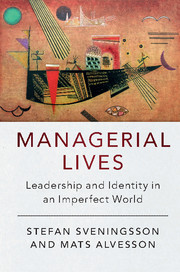Appendix: our method
Published online by Cambridge University Press: 05 June 2016
Summary
We base this book on a number of empirical projects in which, in addition to studying companies and other organizations, we have also focused on a selected group of individuals we see as being suitable for focused, in-depth studies. Some of the interviews and observations have been conducted by other researchers – Johan Alvehus, Tony Huzzard, Dan Kärreman, Daniel Nyberg, Jens Rennstam, Robyn Thomas and Robert Wenglén – who were, to varying degrees, active members of the research group Lund University Management and Organization Studies (Lumos) at Lund University at the time. We have had in-depth discussions of the interpretations within the research group, which is why we have a good understanding of the empirical despite not having conducted all the interviews ourselves. The quality of the interpretations has also been enhanced thanks to fruitful and creative group discussions. The selection is random; it includes people we have come into contact with in connection with broader organizational studies, for example managers of units we have studied in conjunction with studies of organizational change, knowledge work or similar topics. In our experience, there are great benefits in undertaking ambitious studies where rich material is of more importance than material that is broad and superficial. There are (too) many studies which have used questionnaires or one-off sixty-minute interviews. We are doubtful as to whether these can provide a qualified illustration of complex phenomena (Alvesson 2011a).
In this study, we have prioritized material that is deep and rich. But since we have been working with this for a relatively long period of time and have combined studies reported here with a range of other projects, we also have a large, broad foundation. Given the seriousness of our ambition, we have included a relatively large number of managers and working environments.
In order to gain depth, but also to give the reader the opportunity to become familiar with individuals and understand contexts, we have focused on thirteen managers whom we see as main actors. These have been studied closely, and we follow them throughout the book. We also have more than fifteen secondary actors who provide variation and supplement the main actors. Their appearances are more sporadic, but each appears more than once in the text.
- Type
- Chapter
- Information
- Managerial LivesLeadership and Identity in an Imperfect World, pp. 334 - 338Publisher: Cambridge University PressPrint publication year: 2016



